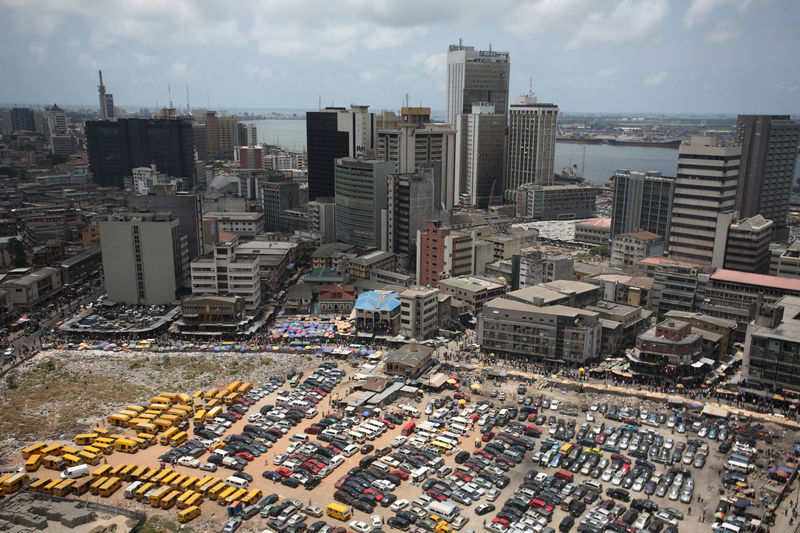* Face masks mandatory in public, overnight curfew in place
* Federal ban on non-essential interstate travel
* Kano state, with rising cases, to begin two-week lockdown
(Adds curfew, face masks and Kano state lockdown)
By Libby George
LAGOS, April 27 (Reuters) - Nigeria will begin a "phased and
gradual" easing of more than four weeks of lockdowns in the
national capital and the largest city on May 4, President
Muhammadu Buhari said in an address on Monday.
Lagos and Ogun states and the federal capital territory of
Abuja entered lockdowns to tame the spread of the new
coronavirus on March 30.
Confirmed cases of the new virus have roughly quadrupled
since a lockdown extension was announced on April 13, to 1,273
cases and 40 deaths, most concentrated in Lagos and Abuja.
But Buhari said the lockdowns had come at a "very heavy
economic cost," stripping many citizens of their livelihoods.
"No country can afford the full impact of a sustained
lockdown while awaiting the development of vaccines," Buhari
said.
Millions of Nigeria's 200 million citizens, more than 20
million of whom live in Lagos, live on daily wages, and the
lockdown left many without money to buy food.
Authorities will enforce an overnight curfew, from 8 p.m. to
6 a.m., and also will require all those who are out during the
day to wear face masks.
The federal government will also enforce a ban on
non-essential movement between Nigeria's 36 states, a measure
the governors' forum had requested. President Buhari, however, announced a new two-week lockdown
in the northern state of Kano, effective immediately. Cases
there have risen to 77, putting it behind only Lagos and Abuja,
and public health authorities are investigating a reported spike
in suspicious deaths in the economically powerful capital city
of the same name. Kano state's governor began a lockdown there from April 16.
"The federal government shall deploy all the necessary
human, material and technical resources to support the state in
controlling and containing the pandemic," Buhari said.
(Additional reporting By Alexis Akwagyiram in Lagos and Paul
Carsten and Felix Onuah in Abuja
Editing by Chris Reese and Jonathan Oatis)
- English (USA)
- English (UK)
- English (India)
- English (Canada)
- English (Australia)
- English (South Africa)
- English (Philippines)
- Deutsch
- Español (España)
- Español (México)
- Français
- Italiano
- Nederlands
- Português (Portugal)
- Polski
- Português (Brasil)
- Русский
- Türkçe
- العربية
- Ελληνικά
- Svenska
- Suomi
- עברית
- 日本語
- 한국어
- 简体中文
- 繁體中文
- Bahasa Indonesia
- Bahasa Melayu
- ไทย
- Tiếng Việt
- हिंदी
UPDATE 2-Nigeria to begin 'phased and gradual' easing of lockdowns in Lagos, Abuja
Published 27/04/2020, 20:36
UPDATE 2-Nigeria to begin 'phased and gradual' easing of lockdowns in Lagos, Abuja

Latest comments
Install Our App
Risk Disclosure: Trading in financial instruments and/or cryptocurrencies involves high risks including the risk of losing some, or all, of your investment amount, and may not be suitable for all investors. Prices of cryptocurrencies are extremely volatile and may be affected by external factors such as financial, regulatory or political events. Trading on margin increases the financial risks.
Before deciding to trade in financial instrument or cryptocurrencies you should be fully informed of the risks and costs associated with trading the financial markets, carefully consider your investment objectives, level of experience, and risk appetite, and seek professional advice where needed.
Fusion Media would like to remind you that the data contained in this website is not necessarily real-time nor accurate. The data and prices on the website are not necessarily provided by any market or exchange, but may be provided by market makers, and so prices may not be accurate and may differ from the actual price at any given market, meaning prices are indicative and not appropriate for trading purposes. Fusion Media and any provider of the data contained in this website will not accept liability for any loss or damage as a result of your trading, or your reliance on the information contained within this website.
It is prohibited to use, store, reproduce, display, modify, transmit or distribute the data contained in this website without the explicit prior written permission of Fusion Media and/or the data provider. All intellectual property rights are reserved by the providers and/or the exchange providing the data contained in this website.
Fusion Media may be compensated by the advertisers that appear on the website, based on your interaction with the advertisements or advertisers
Before deciding to trade in financial instrument or cryptocurrencies you should be fully informed of the risks and costs associated with trading the financial markets, carefully consider your investment objectives, level of experience, and risk appetite, and seek professional advice where needed.
Fusion Media would like to remind you that the data contained in this website is not necessarily real-time nor accurate. The data and prices on the website are not necessarily provided by any market or exchange, but may be provided by market makers, and so prices may not be accurate and may differ from the actual price at any given market, meaning prices are indicative and not appropriate for trading purposes. Fusion Media and any provider of the data contained in this website will not accept liability for any loss or damage as a result of your trading, or your reliance on the information contained within this website.
It is prohibited to use, store, reproduce, display, modify, transmit or distribute the data contained in this website without the explicit prior written permission of Fusion Media and/or the data provider. All intellectual property rights are reserved by the providers and/or the exchange providing the data contained in this website.
Fusion Media may be compensated by the advertisers that appear on the website, based on your interaction with the advertisements or advertisers
© 2007-2025 - Fusion Media Limited. All Rights Reserved.